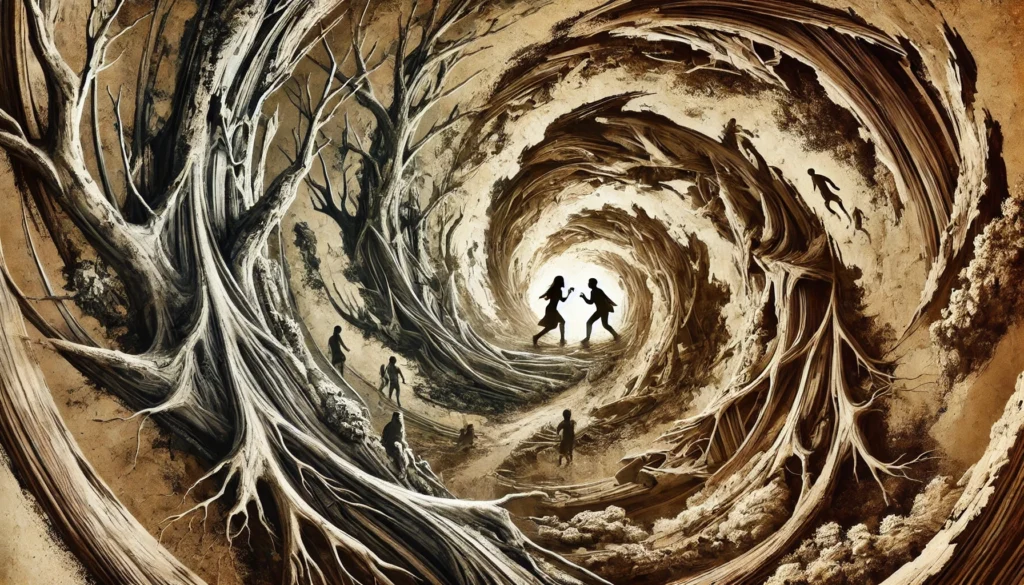READ IT TO ME: Click play to listen to this post.
“If you don’t know where you are going any path will get you there, except the path leading to a rabbit hole.” – Anonymous
Addicts are forever getting hooked on issues that lead to a rabbit hole. A rabbit hole in a relationship looks like an old argument never settled where either party could avoid the front end and go to the back end of the conflict, and just fight endings. Both know the content and are stuck with no solution, ending at the same place where they started. Rabbit holes always bring you back where you began with no change in position. Rabbit hole experiences are strange, confusing, and hard to escape.
Motivated by guilt from past affairs, Tom, a sex addict, consented to late-night questions that led to an all too familiar fight with his partner. They never ended or resolved anything. By 3 am Tom was not only exhausted but felt as guilty as he ever did before the fight began. This fight is repeated regularly. The painful pattern of going down the rabbit hole late at night is common to many addicts and conflicted relationships. Addicts often think going down the rabbit hole with their partner is a form of penance they must pay because of their destructive behavior.
Annette, who found out about her sex addict husband’s numerous one-night stands, took the bait and tried to monitor his every move with trackers, cellphone finders, and all sorts of investigative techniques. Her goal was to keep him safe from any possibility of future act-outs. She never really felt safe in the relationship. She learned in the disclosure that he secretly kept a separate phone and used his regular phone as a decoy to cover his tracks. He even parked his car in a place he announced he would be and was picked up by an affair partner for a tryst that lasted about the time he said he would be at the false location. Turned out his wife’s efforts for safety took her down a rabbit hole.
How many times have partners to addicts listened to empty promises and hollow commitments that led to a rabbit hole? How can you avoid a rabbit hole in your recovery and in your relationships?
1. Be a spectator when invited to the race: Rabbit holes in relationships resemble a race. Like a race, the environment is familiar. The opponents know each other. But, unlike a race, where the goal is to declare a winner, the intent of a relationship rabbit hole is to create a game more about whiners than declaring a winner in the conversation. So when you find yourself entering a conversation about an old argument, choose to be a spectator and observe rather than going down the rabbit hole thinking you’ll win when ultimately it’s just a time to whine with nothing ever changed.
2. Detach: Rabbit holes in relationships can be like black ice. Before you realize what’s happened, you have slipped and fallen into a rabbit hole, finding yourself in an old haunted conflict engaging the same old dance with the same results, exhausted with no change. When you realize you have fallen into a rabbit hole, catch yourself in mid-sentence and stop. Detach! Simply stop in your tracks. Take a deep breath and let go of the energy. Refuse to continue. It will be awkward but the pattern interrupt will enable you to get out of the rabbit hole. This tactic can be especially helpful around conflicts that involve political disagreements and global warming conversations as well as crazy-making relationship fights.
3. Build boundaries that don’t blow others away. Today, with social media, it is popular to be rude and tell people to go to hell or to shut up. Some people identify this as disrespecting boundaries. Yet, boundaries are not designed to control someone else’s behavior with rude remarks. Boundaries are established so that you can manage your own behavior, not others. A great way to avoid a relationship rabbit hole is to establish a boundary and not engage in the verbal vitriol that is promised to ensue from incendiary language. Silence can serve as a great boundary. Rather than go down the rabbit hole that you have engaged in countless times before, simply remain silent. Smile with acknowledgment or say “I hear what you are saying.” When someone pushes you to respond, set a boundary and say no more. You don’t have a boundary without a consequence, not to punish but to take care of yourself. When things get circular so that round and round you go, simply end your part of the conversation. It’s a simple way to avoid or escape the rabbit hole in conversation with a partner or others who want to engage in unhealthy communication. Boundaries help avoid high-risk addictive behavior. Simply not showing up to a gathering where others are likely to abuse alcohol or drugs or stepping away from conversations that are unhealthy can be effective. There is no need to blow people away with judgmental remarks or accusations. Further, when high risk is unavoidable, a simple “No thank you” can be effective when offered options that trigger addictive behavior.
There are many rabbit holes in relationships that addicts must avoid. Tools are simple but require perseverance, practice, and conditioning in order to avoid, escape, and manage the many pitfalls that are present. In dysfunctional conversations, if you don’t manage the flow of your own energy well, every path you take will end in a rabbit hole.





